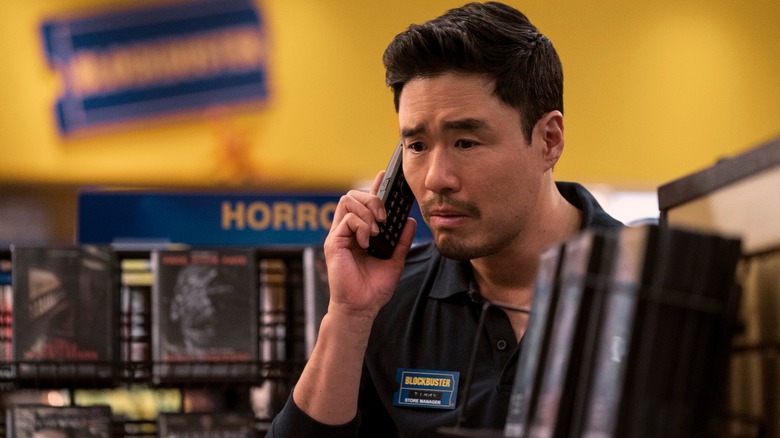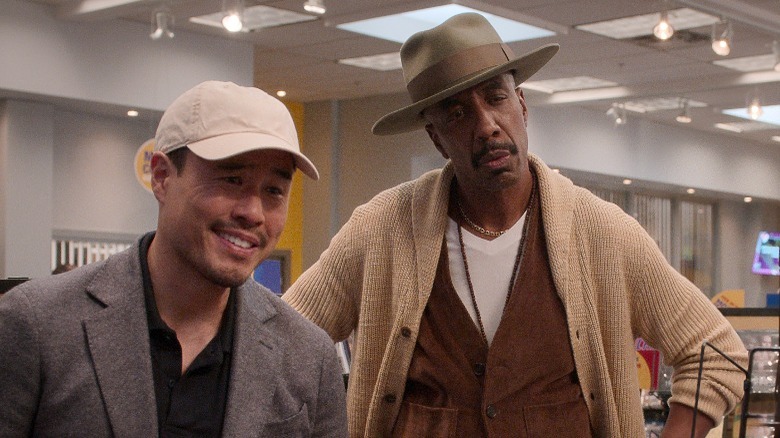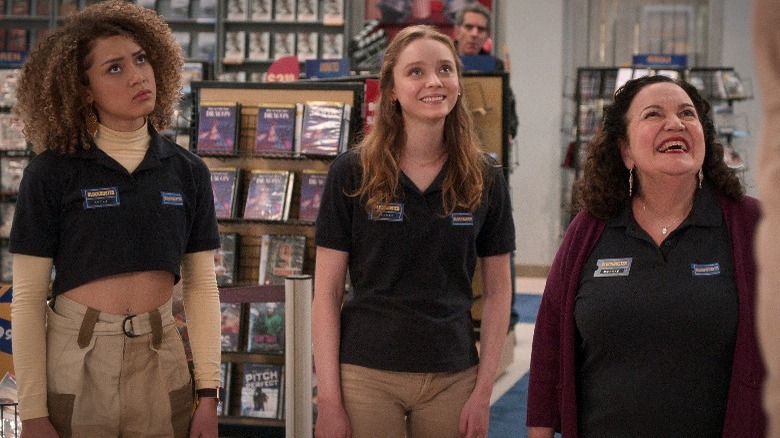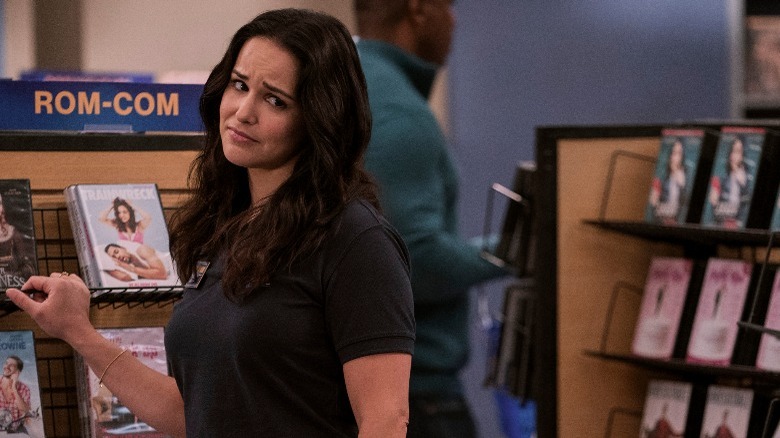
There's a moment in the pilot of "Blockbuster," the new Netflix sitcom from "Brooklyn Nine-Nine" and "Superstore" writer Vanessa Ramos, when the staff of the last Blockbuster in the world reaches their hands out, going in for a morale-raising group cheer. Before they can count down ("'Blockbuster' on three!"), jaded employee Eliza (Melissa Fumero) pauses to point out the irony of a once-monopolizing video store chain that put mom-and-pop stores out of business now being positioned as an underdog. It's an apt footnote and a rare moment of self-awareness for a series that, despite being quite funny, often has trouble reconciling the odd space it takes up in a late capitalist world.
There is, for example, the inherent contradiction of the show's own premise. "Blockbuster" sets itself up as a series that's all about the scrappy fight to keep physical media alive, but it's streaming exclusively on Netflix, the company that was, significantly, the last nail in the video store coffin. The show follows the manager of the last Blockbuster store, Timmy (Randall Park), along with his ragtag group of employees. Among them are his high school crush Eliza, eccentric older employee Connie (Olga Merediz), bisexual film geek Carlos (Tyler Alvarez), frugal, wacky Hannah (Madeleine Arthur), and the landlord's (J.B. Smoove) daughter, Kayla (Kamaia Fairburn).
A Bizarrely Dissonant Look At Late Capitalism

The show's first season ostensibly follows the team as they try to keep Blockbuster in business, but it's dissonant in several ways that make it impossible to wholly enjoy. The documentary "The Last Blockbuster" recently explored the real trials and tribulations of the store this one is seemingly based on, yet the sitcom-ified version of the store is distractingly disconnected from reality. There's little media attention on the store or much anxiety over its future from many of the employees. In fact, a lot of them seem to have endless downtime. The result is a show that often feels like it wants to be an escapist workplace comedy – or worse, a generic network sitcom – despite being set aboard the movie-lovers equivalent of the Titanic.
"Blockbuster" rewrites the company's own timeline, with corporate letting manager Timmy (Randall Park) know that the other seven remaining stores just shut down – in what appears to be 2022. In reality, all but one American Blockbuster shuttered by 2018. This wouldn't be a big deal, except that it's just one of many ways the series seems to be out of touch with the way capitalism functions (or doesn't) in the current moment. "Blockbuster" also positions its landlord character as an aw-shucks pal who simply must raise rent for reasons that are out of his hands. Meanwhile, manager protagonist Timmy employs unpaid interns and contemplates firing a staff member in a plot that's meant to be funny. It's surprising that Ramos is a "Superstore" alum, given how ideologically opposite that capitalist-critical show was in comparison to this one.
Its Wacky Humor Is Its Saving Grace

If you can set its ideological contradictions and the missed opportunities of its setting aside – and I don't blame you if you can't – "Blockbuster" has all the trappings of a fairly funny network sitcom that has room to grow. Despite its Netflix home, the show follows the stylistic and narrative conventions of the more traditional linear TV series' its two leads have previously called home. Its humor, though, is more "Brooklyn Nine-Nine" than "Fresh Off the Boat." There's a deep, only partially-tapped vein of wackiness to the show that keeps "Blockbuster" from becoming a lost cause.
The scripts rattle off pop culture jokes at top speed, and some certainly feel try-hard, but others land well. Even funnier than the movie references -- which are plentiful, thanks to the setting -- are the totally inexplicable jokes, like a bit about "ferret Waco" and a cold open involving Connie that turns hilariously dark. "In The Heights" actress Merediz is a delightful cast highlight here, as is "To All The Boys I've Loved Before" star Arthur. Both have a knack for delivering punchlines that are much weirder than expected, and their characters add an enjoyably unhinged comedic presence that lends the show a lot of likeability.
The Show Is The Definition Of A Mixed Bag

"Blockbuster" has some fundamental flaws, but it also has enough good parts going for it that I think it could course-correct if it earns another season. Despite the two shows' apparent ideological differences, "Superstore" is in its DNA, and it taps into its central relationships – including Eliza and Timmy's – with a deliberate pace that indicates it knows not to dole out all its character development in one season. But for every compelling part of the show, there's another that's cringe-inducing and in need of a rewrite, like Smoove's Bitcoin-investing landlord whose blandly delivered jokes do not necessitate all the screen time he gets.
"Blockbuster" ultimately lives and dies by its scripts, which are the definition of a mixed bag. By season's end, it has established itself as a goofily funny series with some great comedic moments, but also as one that adheres to convention in frustrating ways. More disappointingly, the series not only makes somewhat poor use of its unique setting, but disrespects it by side-stepping the truth of the bleak circumstances that led to an entire industry's downfall.
"Blockbuster" is now streaming on Netflix.
Read this next: 13 Box Office Bombs That Are Truly Worth A Watch
The post Blockbuster Review: A Funny But Frustratingly Contradictory Network-Style Sitcom appeared first on /Film.
0 Commentaires